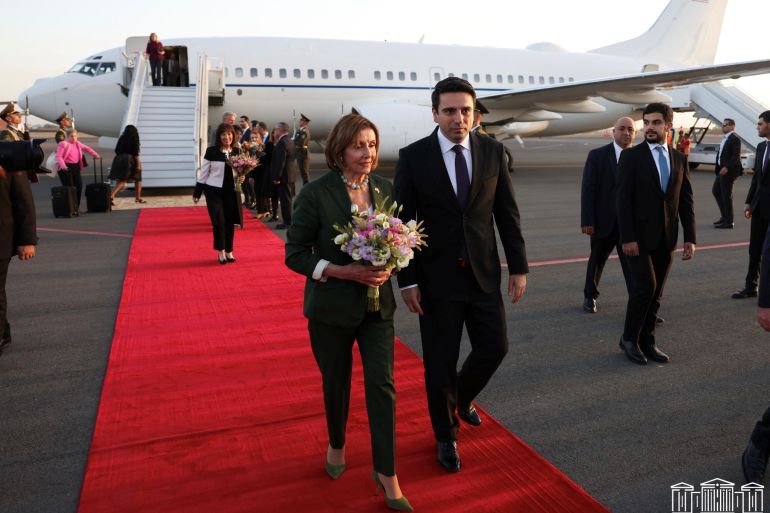Nancy Pelosi visits Armenia as Azerbaijan truce holds
US House speaker’s visit to Yerevan comes days after deadly border clashes broke out between Armenia and Azerbaijan.

US House Speaker Nancy Pelosi has arrived in Armenia, where a ceasefire has held after an outburst of fighting with neighbouring Azerbaijan that killed hundreds of troops from both sides.
Pelosi arrived in the Armenian capital, Yerevan, on Saturday.
Keep reading
list of 4 itemsArmenia, Azerbaijan negotiate another ceasefire: Yerevan
What’s behind renewed fighting between Armenia and Azerbaijan?
‘Situation tense’: Armenia reports new clashes with Azerbaijan
She is the highest-ranking US official to travel to Armenia since the impoverished nation’s independence from the Soviet Union in 1991.
The United States Embassy said Pelosi’s visit will include a meeting with Armenian Prime Minister Nikol Pashinyan. On Friday, Pelosi told reporters in Berlin that the trip “is all about human rights and respecting the dignity and worth of every person”.
Other US legislators accompanying Pelosi include Frank Pallone, chairman of the House Energy and Commerce Committee, and Congresswomen Jackie Speier and Anna Eshoo.
Armenia’s Speaker Alen Simonyan told journalists that Pelosi’s three-day visit will “play a big role in ensuring our security”.
Armenia and Azerbaijan have fought two wars – in 2020 and in the 1990s – over the contested Nagorno-Karabakh region, Azerbaijan’s Armenian-populated enclave.
The 2020 war killed more than 6,500 soldiers from both sides and ended with a Russian-brokered ceasefire. Under that deal, Armenia ceded swaths of territory it had controlled for decades, and Moscow deployed about 2,000 Russian peacekeepers to oversee the fragile truce.
Russia is a military ally of Armenia and also strives for friendly relations with Azerbaijan.
On Tuesday, the worst clashes since the 2020 conflict erupted, with Baku and Yerevan trading blame for the “intense” shelling. Armenia accused Azerbaijan of unprovoked aggression, but officials in Baku said their military was responding to Armenian attacks.
Pashinyan said at least 135 Armenian troops were killed in the fighting, while Azerbaijan’s defence ministry said it had lost 77.
The hostilities ended on Thursday with mediation from the “international community,” according to officials in Yerevan.
Russia took credit for the truce.
Russian President Vladimir Putin told reporters on Friday that the latest clashes had become “localised” under Moscow’s “influence”. When asked whether Russia had the resources to maintain its influence in the region given Moscow’s focus on its nearly seven-month conflict in Ukraine, he replied: “As you can see, there are enough.”
The US however disputes Russia’s claims.
A US official told Reuters news agency at the time of the ceasefire that Washington did not “see any indication that Russian efforts contributed in a positive way towards securing the most recent ceasefire”.
And in a sign of potential challenges, Simonyan, the Armenian speaker, last week expressed unhappiness with the response of a Russian-led military alliance to Yerevan’s request for help, Interfax news agency reported.
Armenia asked the Moscow-led Collective Security Treaty Organisation (CSTO) to intervene, but so far it has just sent a fact-finding team to the region.
“We are very dissatisfied, of course. The expectations we had were not justified,” Simonyan told national television, likening the CSTO to a pistol that did not shoot bullets, Interfax said.
Noting Armenia also had a treaty on mutual assistance with Russia, he said “we expect more tangible steps from our Russian partners, not just statements or half words”.